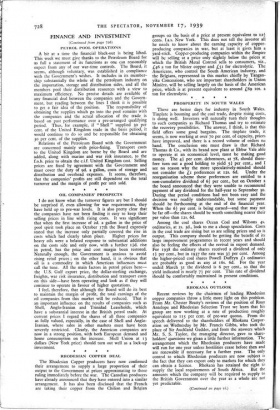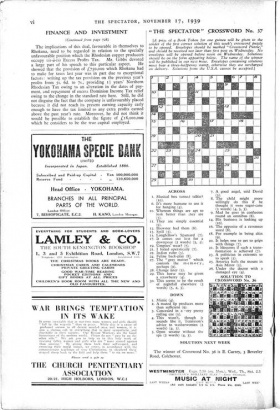Recent reviews by the chairmen of leading Rhodesian copper companies
throw a little more light on this problem. From Mr. Chester Beatty's reviews of the position of Roan Antelope. and Rhodesian Selection Trust we learn that his group are now working at a rate of production roughly equivalent to 515 per cent. of pre-war quotas. From the speech delivered to the shareholders of Rhokana Corpor- ation on Wednesday by Mr. Francis Gibbs, who took the place of Sir Auckland Geddes, and from the answers which Mr. S. S. Taylor, the managing director, gave to share- holders' questions we glean a little further information. The arrangement which the Rhodesian producers have made will run for one year unless hostilities cease before then and are renewable if necessary for a further year. The only control to which Rhodesian producers are now subject is the fact that they can export only to markets for which they can obtain a licence. Rhokana has retained the right to supply the local requirements of South Africa. But the amounts which the company will be required to supply to the British Government over the year as a whole are not yet predictable.
(Continued on page vi.)
The implications of this deal, favourable in themselves to Rhokana, need to be regarded in relation to the specially unfavourable position which the Rhodesian copper producers occupy vis-a-vis Excess Profits Tax. Mr. Gibbs devoted a large part of his speech to this particular aspect. He showed that the provision of £75o,000 which Rhokana had to make for taxes last year was in part due to exceptional factors: writing up the tax provision on the previous year's profits from 5s. 6d. to 7s., providing II years' Northern Rhodesian Tax owing to an alteration in the dates of pay- ment, and repayment of excess Dominion Income Tax relief owing to the change in the standard rate here. Still, he did not disguise the fact that the company is unfavourably placed because it did not reach its present earning capacity early enough to have the tax limited to any extra profits earned above the past year's rate. Moreover, he did not think it would be possible to establish the figure of L18,000,000 which he considers to be the true capital employed.





































































 Previous page
Previous page